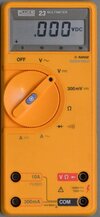Of course, the relevance of that issue depends upon how sensible/careful one is. In what must be about 60 years of using multimeters, I don't think I have ever caused a fuse to blow
When you have a number of Fluke 23's in a student lab, you get used to changing 440mA fuses!


I think one has to consider whether that difference can justify paying 10 times, or even 100+ times the price, particular given that, as I said, I would think that the true 'safety' risk (risk to life and limb) is probably incredibly small - and the 'risk' of destroying a £3 - £15 m
My considerations for multimeter purchases may be quite different to a lone electrician, and aren't based on any safety risks!
Although some considerations may not be obvious. None of these reasons necessarily justify the huge prices differences, but hey ho!
Consistency - we already have hundreds of Flukes. I can buy a 115 today to replace an old 111 - and importantly for us, no experiment scripts would have to be changed.
Similarly for year groups, we want to introduce equipment in the first year that will be familiar through to their graduation; from familiarity comes proficiency!
...and even further than that, ideally we will be using the same equipment that they will find in a research environment.
Hence a lot of Fluke, Tektronix and Agilent kit makes its way into the teaching labs.
Reliability - The Flukes have been bullet proof for us. Although the rotary dials need some contact cleaner every so often.
They just 'Thud' satisfyingly, if they fall off our tall benches

Quality - this is an odd consideration.
Students are paying a lot of money for their course and want to see that money being spent well. Even though I could fill the lab with cheap multimeters and equipment, the students would be wondering where their money was being spent, even if it was being utilised better elsewhere! There is a fine line to tread, and the 'touch points' that students interact with need to be of a certain quality.
A down side to Flukes - apparently they are eminently steelable!
One visiting rep was really surprised that we had so many Flukes out on the benches - another university he had visited, had disposed of all of theirs, because they just kept going missing!
Not a problem for us, so far



